 Pandemics? Unrest? Floods? Fires? Terrorism? Quakes? Financial shocks? An economy with POEMs (Public Official E-Markets) would be poised to mobilize, relieve, contain, and recover, but also avoid.
Pandemics? Unrest? Floods? Fires? Terrorism? Quakes? Financial shocks? An economy with POEMs (Public Official E-Markets) would be poised to mobilize, relieve, contain, and recover, but also avoid.
1) RESOURCES: Pre-emptive procurement
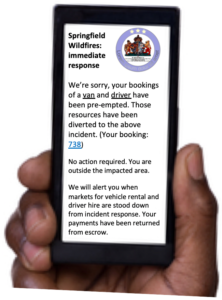 POEMs is built around small transactions. It verifies counterparties, screens for fraud, ensures completion, and aggregates hour-by-hour purchases of labor or rental of resources into tailored packages. That allows it to quickly pull together supply chains for needs of a crisis. Any qualified seller can enter those chains in seconds.
POEMs is built around small transactions. It verifies counterparties, screens for fraud, ensures completion, and aggregates hour-by-hour purchases of labor or rental of resources into tailored packages. That allows it to quickly pull together supply chains for needs of a crisis. Any qualified seller can enter those chains in seconds.
POEMs’ enabling legislation might mandate the right of elected officials to pre-empt market activity when a state-of-emergency is declared. So, if wildfires start, a Governor’s staff may immediately begin renting additional pumps, hoses, water tanks, and protective gear. Delivery, arrival scheduling, payment, and auditing would be automatically handled by POEMs.
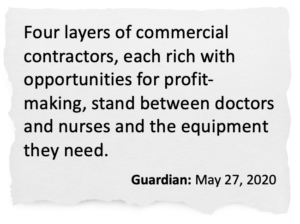 A phased, easily monitored, supply chain could be converging on the afflicted area within minutes. Simultaneously, security staff, childcare professionals, social workers, and volunteer firefighters could be mobilized and transported. Each person might be pulled from existing transactions simply because government pays more, or has legal pre-emption rights over non-vital bookings. Or pre-emption could be voluntary.
A phased, easily monitored, supply chain could be converging on the afflicted area within minutes. Simultaneously, security staff, childcare professionals, social workers, and volunteer firefighters could be mobilized and transported. Each person might be pulled from existing transactions simply because government pays more, or has legal pre-emption rights over non-vital bookings. Or pre-emption could be voluntary.
Either way, POEMs would allow emergency services to set up templates of needs for disasters. One click then starts – for example – all the buying/scheduling listed for floods in a given location. And the template can deliver a constant real-time dashboard of availability and costs of extra resources that would be needed if the river banks burst today.
2) CASH: Targeting, auditing, speeding
Covid revealed unreadiness of today’s closed platforms for an emergency. But any public agency could turn to POEMs’ tools during an emergency. Its trove of data built up about a user is under each person or organization’s control. If they want to release their verified details to be matched with government aid, they need only tick a box for POEMs to locate and transfer any funds for which they are eligible.
Legislation enabling POEMs could compel operators to maintain readiness for an emergency. So, a turnkey operation is poised when a crisis is declared. Compare that possibility to current public infrastructure readiness for crisis as revealed by the 2020 pandemic:
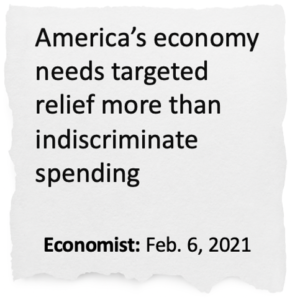 When US Unemployment Insurance claims spiked in March 2020, multiple systems run by states crashed, forcing some users to spend days re-entering details.
When US Unemployment Insurance claims spiked in March 2020, multiple systems run by states crashed, forcing some users to spend days re-entering details.- Puerto Ricans had to wait weeks for federal stimulus checks as government IT systems failed under load.
- Support paid out under America’s CARES act had to be set at a one-size-fits-all $600 a week. Systems handling the transfers could not handle escalating payment for the neediest.
Does the private sector deliver more emergency-ready infrastructure? The problem here is not antiquated systems, it’s often operators putting their own needs first, or lacking capacity:
- After 2008, some banks used bailout funds to pay bonuses or make acquisitions.
- US retail behemoths committed to rapidly expanding public virus testing in mid-March 2020. By early June only 4% of their stores offered the service. How much better might individual pharmacists have done in markets that assembled all resources they needed?
- Banks held back $10bn in fees for dispersing government business loans in the US.
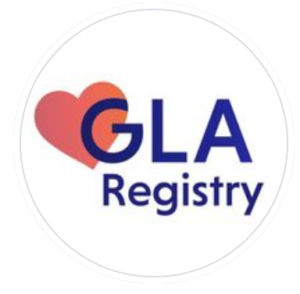 There have been heroic attempts to sidestep these failings. Two friends created the Greater Los Angeles Hospital Registry, a volunteer-run website on which managers could appeal for protective gear for staff. But real responsiveness to emergencies probably requires state-of-the-art, universal, economic infrastructure already in wide use.
There have been heroic attempts to sidestep these failings. Two friends created the Greater Los Angeles Hospital Registry, a volunteer-run website on which managers could appeal for protective gear for staff. But real responsiveness to emergencies probably requires state-of-the-art, universal, economic infrastructure already in wide use.
3) INSTITUTIONS: Fast response
 A crisis can require a new organization. Suppose, after serious unrest, a Mayor wants a Community Safety Taskforce (CST) to supplement formal policing. She might decide the new force was to come from deprived zip codes and each member must have experience in the military, security, or community service, plus proven reliability.
A crisis can require a new organization. Suppose, after serious unrest, a Mayor wants a Community Safety Taskforce (CST) to supplement formal policing. She might decide the new force was to come from deprived zip codes and each member must have experience in the military, security, or community service, plus proven reliability.
POEMs might instantly identify 1,738 matching residents. An offer of paid training, and work thereafter, could be in their Opportunity Feeds in seconds. POEMs’ market for sweatshirt printers could arrange temporary uniforms. Meanwhile, the system’s Verified Voting functionality might be harnessed to profiles of candidates for a CST supervisory board, perhaps with 72 hours allocated for an election. Once trained, wardens could be deployed in line with need, each having their own portfolio of other economic activity.
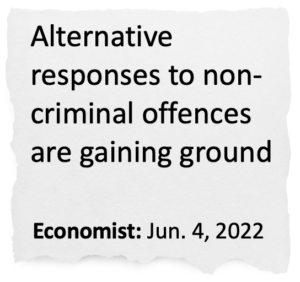 There would be political, fiscal, and inter-organizational issues. But when leaders are ready to act decisively, POEMs could make their ambitions immediate, accountable, and lowest-overhead. With the old administrative machinery for this sort of initiative no longer required, it can be short term; a fast response to events. The Mayor might decree her new force will only run for three months, with commitment to a formal review thereafter. But if citizens want to then extend it, POEMs awaits.
There would be political, fiscal, and inter-organizational issues. But when leaders are ready to act decisively, POEMs could make their ambitions immediate, accountable, and lowest-overhead. With the old administrative machinery for this sort of initiative no longer required, it can be short term; a fast response to events. The Mayor might decree her new force will only run for three months, with commitment to a formal review thereafter. But if citizens want to then extend it, POEMs awaits.
This precision use of resources would contrast with – for example – Britain’s mass hiring of Covid contact tracers with many then reporting no work for them to do. Or the same government’s inability to deploy thousands of community volunteers. Anyone needing to suddenly staff up on caregivers, Social Distancing Ambassadors, mental health counsellors, or other positions, could set their requirements in terms of track record, see numbers of eligible workers, schedule induction sessions, then buy hours as needed. Assuming online training, a pool could – if desired – go from zero to hundreds of pre-screened, ready to go, workers in a few hours.
4) V.F.M.: Stop the splurge
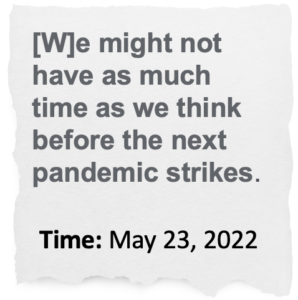 “Coronavirus may not be the big one” warned World Health Organization experts in December 2020, the same month it became clear 2020 was the worst year on record for extreme weather. Weeks later US public bodies were warned of nationwide domestic terrorism plans. Mind numbingly, governments may need to adapt to disasters as a new normal. Simply printing money will become untenable. POEMs could uniquely enable Value For Money responses to what lies ahead.
“Coronavirus may not be the big one” warned World Health Organization experts in December 2020, the same month it became clear 2020 was the worst year on record for extreme weather. Weeks later US public bodies were warned of nationwide domestic terrorism plans. Mind numbingly, governments may need to adapt to disasters as a new normal. Simply printing money will become untenable. POEMs could uniquely enable Value For Money responses to what lies ahead.
Here’s why:
- Mandated readiness: Purely commercial infrastructure operators lack incentive to maintain expensive spare capacity in case there is an unexpected surge. POEMs is shaped by legislation which could mandate, for example, operators maintain 25% processing margin over the highest peak of any previous day and could power up for a 50% surge in usage within an hour. The jurisdiction’s organizing infrastructure will then be dependable at times of need.
- Buy-backs: In a pandemic, POEMs could – for example – instantly allow shuttered businesses that used surgical masks (veterinary surgeries, beauty parlors, cosmetic surgeons) to re-sell their stocks immediately to frontline hospitals. POEMs could prioritize each business for re-supply later. It’s faster, cheaper, and greener than government stockpiling supplies.
 Early warnings: A well-used POEMs would do a lot to forestall shocks. Anyone could tap POEMs’ data to assess metrics that flag emerging problems. An index tracking rental of home security items in a locality for example is a good proxy for levels of nervousness about crime among householders who know their area.
Early warnings: A well-used POEMs would do a lot to forestall shocks. Anyone could tap POEMs’ data to assess metrics that flag emerging problems. An index tracking rental of home security items in a locality for example is a good proxy for levels of nervousness about crime among householders who know their area.- Inflation tamped: Sudden government spending distorts an economy. That’s a particular risk where resources are limited. Official purchases of accommodation for the displaced for instance can push up rental prices. But POEMs is uniquely equipped to attract new resources – spare rooms, annexes, attics – that take the heat off as prices rise.
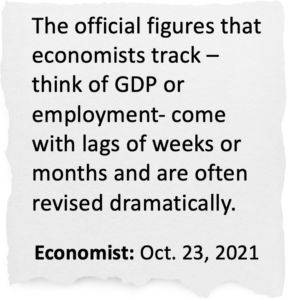 Accountability: Precision purchasing in informed markets, instantly open to any seller, should make interventions more palatable. Fraud, over-commissioning, cronyism, or failures to respond can be identified, then remedied, faster than before, or stopped by system tools. If there is paralysing dissent on issues, POEMs’ verified voting harnessed to a quick referendum would be a novel option.
Accountability: Precision purchasing in informed markets, instantly open to any seller, should make interventions more palatable. Fraud, over-commissioning, cronyism, or failures to respond can be identified, then remedied, faster than before, or stopped by system tools. If there is paralysing dissent on issues, POEMs’ verified voting harnessed to a quick referendum would be a novel option.
5) RESILIENCE: Total Economic Potential
It can be a challenging notion, but mono-skilled dependency on one organization – aka “a job” – may not always offer the best security for life’s shocks. POEMs can unlock an array of economic opportunities for each user. Take a single mom, 30, currently employed as a duty manager in a supermarket. She has a job, but, like so many of today’s workforce, her hours and income are unpredictable, and chances of meaningful promotion are negligible. With hours scheduled according to the shop’s needs, she is particularly vulnerable as spending shrinks.
 POEMs would be ready to exploit as much of her economic potential as she wished. Perhaps she had training as a first aider in the past? She has a hairdressing licence and did pre-Christmas mail sorting? POEMs can seamlessly also connect her to businesses or households looking for these skills.
POEMs would be ready to exploit as much of her economic potential as she wished. Perhaps she had training as a first aider in the past? She has a hairdressing licence and did pre-Christmas mail sorting? POEMs can seamlessly also connect her to businesses or households looking for these skills.
And her life story will have given her more general abilities; computer literacy, childcare, home decorating. Combined with POEMs’ datastreams this creates her potential skills; in-demand worktypes that she only needs a bit more learning to offer.
Then there’s community services she could provide; an unused parking place or storage in her father’s shed. What possessions might she profitably rent? A former partner’s workwear? Her kid’s old teaching aids? Does she have spare cash to lend, even if only in $10-for-a-day increments? Does she need micro-insurance or special kit to exploit other talents? Are there interventions with which POEMs could align her?
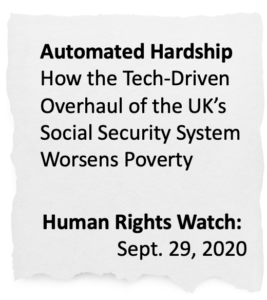 None of this would ever be obligatory. But POEMs’ operators would have a compelling need to see she makes as much as possible. If she wants to do that by progressing to more stable employment, POEMs will help. But the system sees her as so much more than just her job. That “flexi-curity” offers multiple avenues to survive a crisis.
None of this would ever be obligatory. But POEMs’ operators would have a compelling need to see she makes as much as possible. If she wants to do that by progressing to more stable employment, POEMs will help. But the system sees her as so much more than just her job. That “flexi-curity” offers multiple avenues to survive a crisis.
